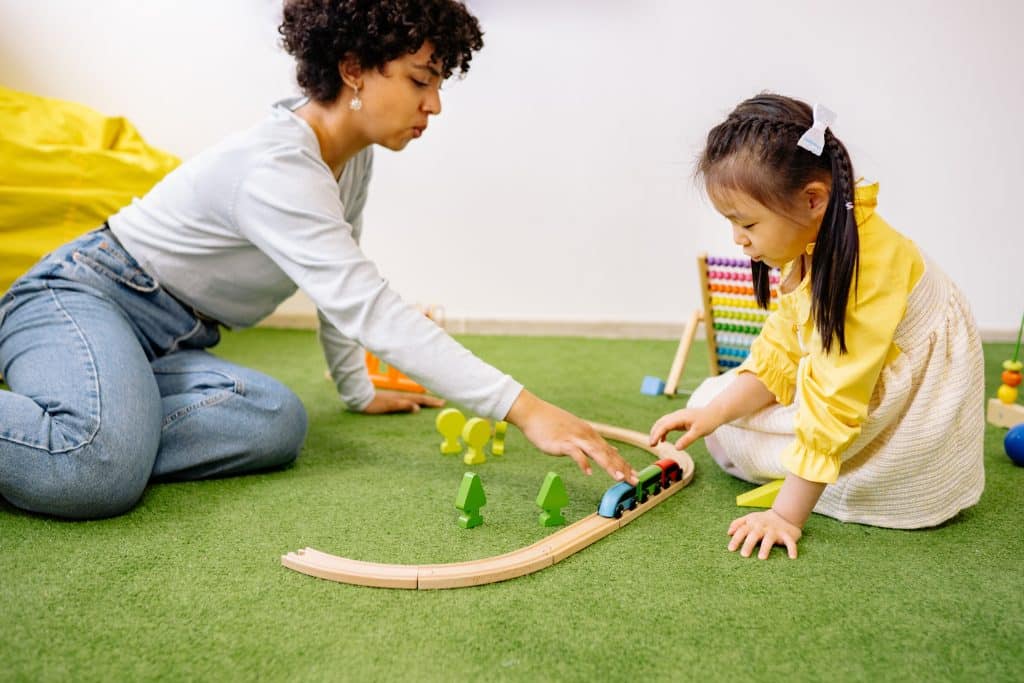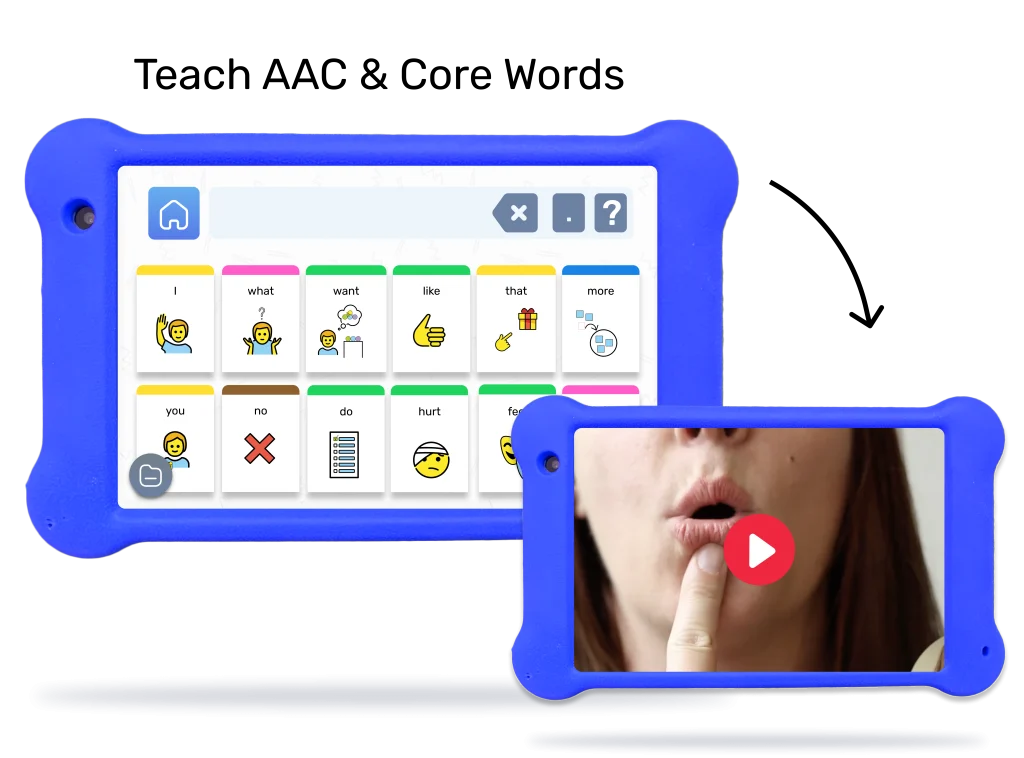Have you ever noticed your child repeating words when speaking and wondered, is this normal? You’re not alone! In fact, many parents have the same question. This article will help you understand why your child might be engaging in this behavior and how it’s connected to their development. So let’s dive in together!
Table of Contents
Repeating Words When Speaking: Echolalia
Echolalia is a term used to describe the act of repeating words or phrases spoken by others – kind of like a verbal “echo.” It’s important to know that echolalia can be a natural part of language development for some children. While for others, it may indicate an underlying issue.
When we think about a child repeating words when speaking, it might be tempting to assume they do not really understand what they’re saying. But that isn’t always true! Here are two common misconceptions about echolalia:
Misconception 1: Echolalia Means My Child Doesn’t Understand Language
While it’s true that some kids with echolalia may struggle with comprehension, many actually do understand what they’re echoing! They might just need extra time or help to organize their thoughts before responding.
“Which language games will help my kid the fastest?” 👇
Goally’s tablet has some of the top language learning games & apps that help kids learn their first 50 words, practice finger dexterity & fine motor skills, AND communicate with AAC.
Misconception 2: Only Children With Autism Engage in Echolalia
Although echolalia can be more prevalent in children on the autism spectrum, other neurodiverse and neurotypical kids may also experience this phenomenon as part of their language development journey.
In upcoming sections, we’ll explore reasons behind why children repeat words when speaking and offer tips on how parents can support them through this process.
Reasons for Repeating Words While Speaking in Autism
When it comes to children with autism, language development may not follow the traditional milestones we expect. For some autistic kids, echolalia serves as a stepping stone to build their communication skills – so when your child is repeating words when speaking, they might be practicing new sounds or phrases!
Children on the autism spectrum often face unique social communication challenges that can make connecting with others difficult. Echolalia could be their way of attempting to join a conversation or imitate social interactions they’ve observed – even if it doesn’t always come across as expected.

Read more: 7 Short Term Memory Examples
Autistic children may also experience sensory processing differences that lead them to seek comfort through repetitive behaviors like echolalia. When your child repeats words when speaking, it could be a coping skill that helps them feel more in control of their environment and regulate overwhelming emotions.
Types of Echolalia
Immediate Echolalia
Immediate echolalia occurs when a child repeats words or phrases right after hearing them – think of it as an instant echo! For example, you might ask your child, “Do you want juice?” only for them to respond with “Want juice,” rather than answering “yes” or “no.”
There are both benefits and challenges associated with immediate echolalia. On the one hand, this type of repetition can help kids practice language skills and eventually learn how to use these phrases independently. However, immediate echolalia may also create misunderstandings if others assume the child isn’t grasping the meaning behind what they’re echoing.

Delayed Echolalia
Delayed echolalia involves repeating words or phrases heard in the past, sometimes hours or even days after they were first spoken. For instance, your child might suddenly recite lines from their favorite TV show while playing outside.
Delayed echolalia can offer some benefits, like aiding memory recall and providing a sense of familiarity for children in new situations. However, it can also be challenging when the echoed phrases don’t fit the current context or conversation – making it harder for others to understand what the child is trying to communicate.

Read More: What is AAC?
Treating Echolalia
If your child’s echolalia is affecting their ability to communicate effectively, a speech therapist can be an invaluable resource. These professionals specialize in language development and can work with your child to improve their communication skills while addressing any underlying challenges. There are several evidence-based approaches that speech therapists might use to support children who engage in echolalia, including:
- Functional Communication Training (FCT) – In FCT, the focus is on teaching kids to use more purposeful and meaningful ways of communicating instead of simply echoing words or phrases.
- Picture Exchange Communication System (PECS) – This visual approach uses pictures to help children express themselves more effectively when they struggle with verbal communication.
- Social Stories – Developed specifically for individuals on the autism spectrum, social stories provide clear guidance on expected behaviors and social norms through simple narratives and visuals.
Tips for Parents if Their Child is Repeating Words When Speaking
Encourage Meaningful Communication With Your Child
- Prompt them to answer questions or participate in conversations.
- Provide wait time to allow them to process language.
- Model appropriate language usage.
Truly, as a parent, you play an important role in fostering meaningful communication! Ask open-ended questions that encourage conversation, and give your child ample time before expecting a response—patience goes a long way!
Create a Supportive Environment
- Offer visual cues, such as picture schedules or social stories, as needed.
- Ensure your home is sensory-friendly.
Visual supports can make understanding expectations much easier for kids who struggle with verbal instructions alone – plus, they’re great tools for promoting independence! Aim also for creating calm spaces where sensory distractions are minimized so that focusing on communication becomes easier.
Work Closely With Professionals
- Collaborate on goals related to language development.
- Attend sessions with your child’s speech therapist, if possible.
Teaming up with professionals can make a world of difference in your child’s progress. Don’t hesitate to ask questions and share your insights – you know your child best!

Goally | Teach Kids AAC & Core Words
Is your child facing challenges in expressing themselves or communicating effectively? Goally’s language apps support their journey in building essential communication skills! All of these apps are included our skill-building tablet made for kids.

The Word Lab and AAC Talker apps provide a simple, engaging platform for your child to learn core words and become a functional communicator right from the start. Customize the experience with a voice that suits them, and watch as their confidence grows in expressing their thoughts and needs!
But we don’t stop there. Our Balloon App helps build the skills needed to use AAC by engaging your child with fun, interactive “pop the balloons” exercises. It’s a game-changer for kids who need that extra boost in communication.
To sum up a child repeating words when speaking can be a natural part of language development. Or it can be an indicator of underlying challenges, especially for children with autism. It’s important to recognize the reasons behind this behavior and explore different types of echolalia to better understand your child’s needs. Seeking professional support from speech therapists and utilizing evidence-based therapy approaches can make a legitimate difference in your child’s communication journey. And finally, don’t forget about Goally’s digital tools! These resources are specifically designed to foster independence, routines, and life skills for children with ADHD and Autism—empowering them as they navigate through the fascinating world of language and communication.
This post was originally published on 03/29/2023. It was updated on 11/22/2023.

Goally
We help parents teach their kids life skills, like doing bedtime and morning independently. Backed by science, we incorporate evidence-based practices and expert-informed designs in all of our apps and content.






